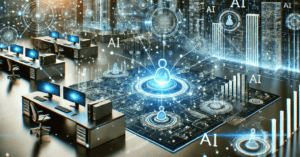KPMG’s AI Revolution: Smart Agents That Work 24/7—But at What Cost to Jobs?
KPMG is developing an advanced AI system, known as agentic AI, to enhance efficiency across its audit, tax, and advisory services. Unlike traditional AI chatbots, agentic AI can make independent decisions and complete complex tasks without human input. These AI agents will have both high IQ and emotional intelligence (EQ) to better serve clients.
The company is collaborating with tech partners to create AI-powered solutions for improving productivity and business insights. Other firms, like PwC, are also adopting similar AI-driven technologies.
Experts, including Mark Zuckerberg, predict AI may replace mid-level software engineers, with Meta expecting AI to generate code by 2025. IBM’s CEO, Arvind Krishna, foresees AI automating up to 30% of jobs in sectors like human resources within five years. While AI enhances efficiency, it raises concerns about job displacement in various industries.

KPMG’s AI Revolution: Smart Agents That Work 24/7—But at What Cost to Jobs?
KPMG, a global leader in professional services, is preparing to launch a cutting-edge artificial intelligence (AI) system designed to operate faster, smarter, and continuously. This new technology, known as “agentic AI,” will serve as a digital assistant across key departments such as audit, tax, and advisory services. Unlike traditional AI tools, this advanced system can independently complete tasks, make decisions, and streamline complex workflows without requiring constant human supervision. Here’s what it means and how it could reshape businesses and jobs.
What Sets Agentic AI Apart?
Unlike basic AI chatbots that simply respond to user queries, agentic AI takes a proactive approach to problem-solving. For example, self-driving cars—an early form of agentic AI—can navigate roads, respond to traffic, and make split-second decisions without a driver’s input. Similarly, AI-powered virtual assistants could manage schedules, generate reports, and analyze data autonomously.
KPMG envisions these AI agents taking on sophisticated tasks in auditing, tax preparation, and client advisory services. By automating routine work, employees will be free to focus on higher-level strategic planning and decision-making.
KPMG’s Vision for Smarter, More Empathetic AI
David Rowlands, KPMG’s global head of AI, explained that the company is partnering with tech firms to develop AI solutions that enhance productivity, customer service, and business insights. What sets KPMG’s approach apart is its emphasis on combining intellectual intelligence (IQ) with emotional intelligence (EQ).
In practical terms, this means the AI won’t just analyze data—it will also be designed to recognize emotions, adapt communication styles, and provide empathetic responses. Imagine an AI-powered tax advisor that not only finds tax-saving opportunities but also explains them in a way that aligns with a client’s stress levels or financial priorities.
Will AI Replace Human Jobs? The Growing Debate
As AI adoption accelerates, concerns about job displacement are increasing. Other firms, such as PwC, are also testing AI-driven solutions to automate tasks like data analysis and report generation.
Tech leaders, including Mark Zuckerberg, have suggested that AI could eventually replace certain roles, such as mid-level software engineers. Meta predicts that by 2025, AI may be capable of writing code as effectively as human programmers, potentially reducing the demand for traditional software engineers.
IBM’s CEO, Arvind Krishna, has also highlighted the impact of AI and automation on the job market. He estimates that up to 30% of certain roles—particularly those involving repetitive tasks, such as human resources—could be replaced by AI within five years. AI-driven systems might take over functions like payroll processing, employee onboarding, and even conflict resolution. While this shift offers efficiency and cost savings, it raises critical questions about the future of employment.
Balancing Efficiency and Employment
AI advocates argue that automation will create new job opportunities rather than simply eliminating roles. As AI handles routine tasks, employees can shift their focus to more creative, strategic, or relationship-driven roles. KPMG’s emphasis on EQ-enabled AI suggests a future where human workers and AI collaborate, with AI managing data-heavy tasks while people focus on decision-making and client interactions.
However, critics warn that the transition may be challenging, particularly in industries reliant on structured processes, such as auditing and software development. Employees will need to reskill and upskill to remain competitive, and businesses must invest in training programs to help workers adapt to the changing landscape.
The Road Ahead
KPMG’s initiative reflects a broader corporate trend: integrating AI not just as a tool, but as a collaborative workforce partner. The success of agentic AI will depend on how well it integrates with human employees and gains client trust. While fears of job loss are valid, history suggests that technology often transforms jobs rather than eliminating them entirely. For example, ATMs revolutionized banking but didn’t eliminate bank tellers—rather, they allowed employees to shift toward customer service and financial advising roles.
Nevertheless, the rapid advancement of AI presents unique challenges. Businesses, policymakers, and educators must work together to prepare the workforce for these changes. Whether agentic AI becomes a tool for empowerment or a force for disruption will depend on how thoughtfully it is implemented and how well society adapts.
Ultimately, KPMG’s agentic AI promises to enhance efficiency, but its long-term impact will hinge on striking a balance between innovation, ethical considerations, and workforce development. As AI adoption grows, the discussion around its role in the future of work is only just beginning.
You must be logged in to post a comment.